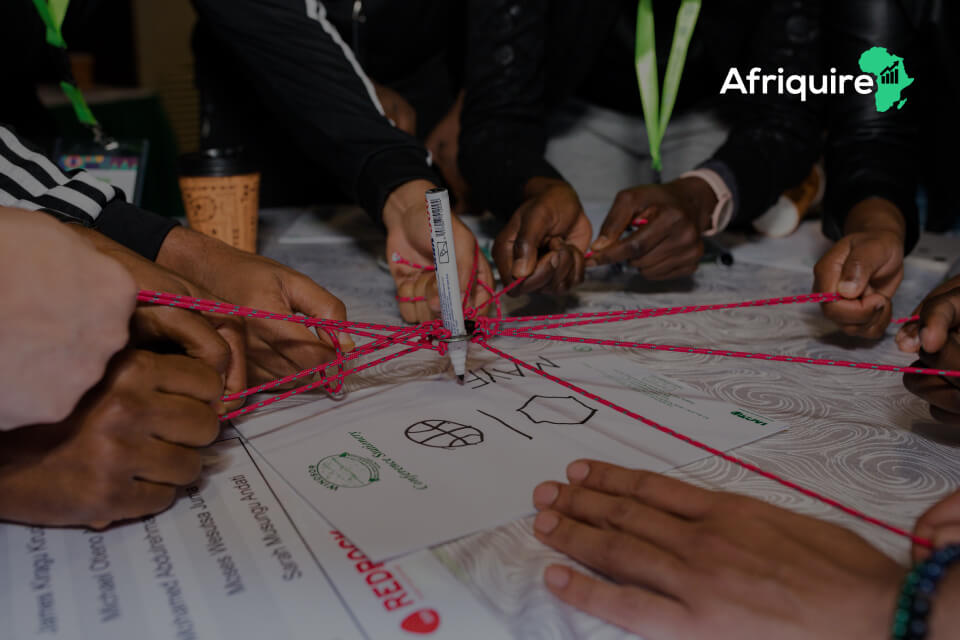Introduction
Have you ever considered how young people can make the world a better place? In Africa, many young people are emerging and making a real difference in their communities. Youth empowerment means equipping young people with the skills, knowledge, and support they need to take control of their lives and effect positive change.
In this article, we examine case studies of successful youth empowerment initiatives in Africa. These stories prove that young people are not just the leaders of tomorrow but also the changemakers of today. From education to business, these projects inspire us to believe that, with the proper support, young people can achieve great things.
- Importance of Youth Empowerment in Africa’s Socio-Economic Development.
The future of Africa lies in its youth. With so many young people in Africa, they can definitely contribute to the economic growth and social development of their societies. They will be able to create jobs, bring innovation, and develop strong communities. When young people succeed, the entire country benefits.
That is why it is very relevant to learn from case studies of successful youth empowerment initiatives. These stories will help us understand what works and encourage new ideas for the future.
- Challenges Faced by African Youth.
In Africa, many young people face significant challenges that can make life quite difficult. One of the biggest problems is unemployment. Imagine finishing school, feeling excited about your future, and then discovering that there are not enough jobs available for you and your friends. This situation can lead to feelings of frustration and hopelessness. Many graduates struggle to find work because the job market is not big enough to accommodate them all.
Another significant challenge is the lack of access to education. In some areas, schools are far away or don’t have good facilities like proper classrooms or learning materials. This makes it hard for young people to learn effectively. Without a good education, it becomes nearly impossible to get decent jobs or even start their own businesses. Education is like a key that opens doors to opportunities. Lack of education keeps that door shut.
These challenges hold African youths back from reaching their full potential. However, there’s hope! With the right kind of support and initiatives aimed at empowering these young people, they can overcome these obstacles and thrive.
There are youth empowerment initiatives focused on improving the future of young people. Some programs offer vocational training to equip youths with the practical skills needed in the job market. Others focus on entrepreneurship by providing young people with the tools and resources they need to start their businesses. When youths are empowered through education and skill development, they become more confident and capable of creating better futures for themselves.
- Purpose of Exploring Successful Case Studies to Inspire and Inform Future Initiatives.
From reviewing successful cases, inspiration can be drawn for creating new initiatives by copying ideas or replicating them in the future. Examples of successful initiatives that can be replicated in the future include the Paradigm Initiative, which empowers young people to acquire the digital skills necessary for today’s jobs, and Leap Africa, which trains young people to become leaders. These youth empowerment initiatives result in positive changes in society.
These examples demonstrate that when governments and NGOs invest in youth programs, young people can achieve significant results. This showcases the importance of understanding how to create youth empowerment programs in Africa. With proper planning, these programs will go a long way in solving youth challenges. The Nigeria Jubilee Fellows Programme (NJFP), for instance, trains graduates in key skills and connects them with job opportunities. It only serves to demonstrate that young people can land decent employment and work their way to a better future with the correct assistance.
Additionally, international organizations and African governments must prioritize funding opportunities for youth empowerment. These initiatives can reach more young people and have a bigger impact when they have adequate resources. Youth empowerment acts as the driving force for the socioeconomic development of Africa. When youths overcome hurdles such as unemployment and lack of education, they can stand as leaders and innovators. The effect of youth empowerment on social change is very significant, giving birth to stronger communities.

Overview of Notable Youth Empowerment Initiatives in Africa
Youth empowerment goes a long way in securing Africa’s future. Numerous initiatives are equipping young people with the skills to learn new skills, become entrepreneurs, and create a livelihood for themselves. The areas of focus include education, entrepreneurship, agriculture, and digital skills. This demonstrates that, given the opportunity, young people can achieve great things. Let’s examine a few case studies of successful youth empowerment initiatives across Africa.
- Education and Skill Development Programs
A good example is the AkiraChix Program in Kenya. It trains young women in technology and coding. Since tech is a male-dominated field, AkiraChix helps them get the skills to work in tech jobs. This does not just help the women but also makes the tech industry more diverse. With more women in tech, there will be new and creative ideas. That is why education is a significant part of youth empowerment in Africa’s future.
- Entrepreneurship and Innovation Hubs
Another interesting initiative is the Tony Elumelu Foundation (TEF) Entrepreneurship Programme. Through this foundation, young entrepreneurs receive mentorship and funding opportunities for youth empowerment. Each year, TEF selects several thousands of youngsters and provides them with $5,000 as seed capital toward starting their businesses. They are also capabilities. This demonstrates that empowering young entrepreneurs can create employment opportunities and contribute to economic development.
- Agricultural Empowerment Initiatives
The Songhai Centre in Benin empowers the youth in agriculture. This centre teaches sustainable farming methods, which involve growing crops in a manner that protects the environment.
Young farmers learn how to make money from farming while taking care of their land. This is important because agriculture is a big part of Africa’s economy. When young people possess the right skills, they can contribute to improving food security and support their communities. This demonstrates the impact of youth empowerment on social change.
- ICT and Digital Literacy Programs
In today’s world, digital skills are critical. The Digital Jobs Africa program, supported by the Rockefeller Foundation, is helping young people acquire digital skills and secure online employment opportunities.
Many tech companies need workers with digital literacy. This program provides training to help youth secure good employment opportunities within the rapidly growing digital industry. With these skills, young people learn not only to help themselves but also to contribute to economic growth.
These success stories in empowering the youth are proof that young people can indeed have brighter optimism toward the future once provided with empowerment in the forms of education, funding, and skills. Today, various initiatives on education and entrepreneurship, from agriculture to digital skills, cover most parts of the African continent.

Success Stories: Lessons Learned from Effective Programs
Youth empowerment holds the key to Africa’s development. Countless programs have changed the lives of young people. Let us study three examples:
- Rwanda’s YouthConnekt Initiative,
- South Africa’s Harambee Youth Employment Accelerator, and
- Nigeria’s YouWIN!
They teach us valuable lessons in empowering youths rightly.
Case study 1: Rwanda’s YouthConnekt Initiative
Key Outcomes:
It is essential to note that the YouthConnekt Initiative was established in 2012 to empower young people through activities focused on employment, entrepreneurship, and community development. To date, it has created over 36,000 jobs and supported 24,000 young leaders. The program further provides young entrepreneurs with mentorship and funding.
Lesson: Leveraging Public-Private Partnerships for Scalability.
A critical takeaway from YouthConnekt is that collaboration is a strategy used by the government, private sector businesses, and non-profit organisations. The result of these organisations’ collaboration is that the initiative has reached a large number of young people. It, therefore, shows that when different sectors join forces, they can create more significant opportunities for young people.
Case study 2: South Africa’s Harambee Youth Employment Accelerator
Key Outcomes:
In South Africa, the Harambee Youth Employment Accelerator helps young people. It connects them with employers seeking skilled workers. This has helped thousands of young people secure employment.
Lesson: Bridging the Gap Between Skills and Job Market Requirements
One of the most important lessons learned from Harambee is that they tailor training programs to match the jobs available or in demand. This plan helps to bridge the gap between skills and job market requirements. If young people acquire the skills employers need, they are more likely to secure employment and create a bright future for themselves.
Case study 3: Nigeria’s YouWIN! (Youth Enterprise with Innovation in Nigeria)
Key Outcomes:
The YouWIN! program of Nigeria provides young entrepreneurs with start-up funding and business support. Many young people have used this program to turn their ideas into successful businesses.
Lesson: Aligning Government Policies with Youth Empowerment Efforts.
A key lesson from YouWIN! is the importance of aligning government policies with youth empowerment efforts. When governments create supportive policies that encourage entrepreneurship, it becomes easier for young people to succeed. This alignment can lead to significant economic growth and job creation.
These case studies illustrate how youth empowerment is redefining Africa. They demonstrate that if support is provided to the youths, they can create a better future. The impact of youth empowerment on social change is profound, as it develops empowered youths into leaders and innovators.
Scaling and Replicating Successful Youth Empowerment Models
Youth empowerment is essential for Africa’s development. Many successful programmes have shown how to make a real difference in young people’s lives. To make these programmes bigger and bring them to more places, we need to find what works best and adjust them for different situations. Let’s look at how we can do this in the best way.
Identifying Transferable Elements of Successful Programs.
Key elements that make youth empowerment programmes successful can be found when we study those already succeeding. For example:
- Mentorship Programmes: Young people learn better when they have experienced people guiding them.
- Funding Opportunities: Many youths have great ideas but lack the funds to start. Funding helps them turn their ideas into reality.
Focusing on these areas would allow for effective youth empowerment programs across Africa.
Adapting Models to Diverse Socio-Economic and Cultural Contexts.
Each African country has its own culture and economic condition. A programme that works in a city may not work the same way in a village. For example, in urban areas, youths may require more training in business and technology. In contrast, in rural areas, they may need support in agriculture and skills that align with their community’s needs.
To succeed, it’s essential to understand what works for young people in each local area. This approach ensures that initiatives are relevant and impactful, demonstrating how to create youth empowerment programs in Africa that genuinely resonate with young people.
Leveraging Technology to Expand Reach and Impact.
Technology plays a significant role in expanding the reach of youth empowerment programs. For instance, online learning platforms will enable youths to learn from anywhere. Job platforms, such as Digital Jobs Africa, are helping young people secure employment in the digital space. Through technology, youth empowerment programs can be scaled and become more functional.
Building Partnerships with International Organizations and Local Governments.
For youth empowerment programs to be scaled, partnerships have to be created. This means working with:
- International organisations: They provide funding, training, and support.
- Local governments: They ensure that programs align with national priorities and policies.
For example, the YouthConnekt Initiative in Rwanda has thrived by working with different partners. If we have strong collaboration then we can support more youths across Africa.
Monitoring, Evaluation, and Feedback Loops to Ensure Continuous Improvement.
For the youth empowerment programmes to be relevant, there needs to be monitoring of progress. It entails:
- Monitoring: Checking whether the programme is achieving its aims.
- Evaluation: Measuring the success of the programme.
- Feedback loops: Ask youths what they need and improve the programme based on their answers.
Programs like Educate! To stay effective, make improvements, and continue serving young people.
In scaling up and replicating the successful models of youth empowerment, there is a need to:
- Identify what works for them.
- Adapt these models to various community contexts.
- Use technology for wider reach among youth.
- Engage with governments and organisations.
- Monitor progress and continually improve them.
With support from African governments, funding opportunities, and the community, we can create more empowerment programmes that truly change lives.

Frequently Asked Questions (FAQs)
1. What is youth empowerment?
Youth empowerment means equipping young people with the skills, tools, and confidence to take control of their lives and bring about positive change in their communities.
2. Why is youth empowerment important in Africa?
It is essential because young people make up a large part of Africa’s population. When they are empowered, they can get better education, good jobs, and help build stronger communities.
3. How do youth empowerment programs work?
They provide training, mentorship, and resources to help young people develop skills and start their projects or businesses.
4. What challenges do these programs face?
Some challenges include lack of funding to support activities, political problems that affect young people’s opportunities, and cultural beliefs that stop youths from fully taking part.
5. Why should we study case studies of successful youth empowerment programs in Africa?
We can gain insight into what empowers youth by examining these case studies. It enables us to draw lessons from both achievements and setbacks, which can inform future initiatives and regulations that better support the development of young people.
Conclusion
In conclusion, examining case studies of successful youth empowerment initiatives is crucial for understanding how we can effectively support our youths today. It shows us which strategies are effective in different parts of Africa. By learning from successful programmes, we give the next generation a better opportunity. It’s all about empowering the youth and building a great future.



